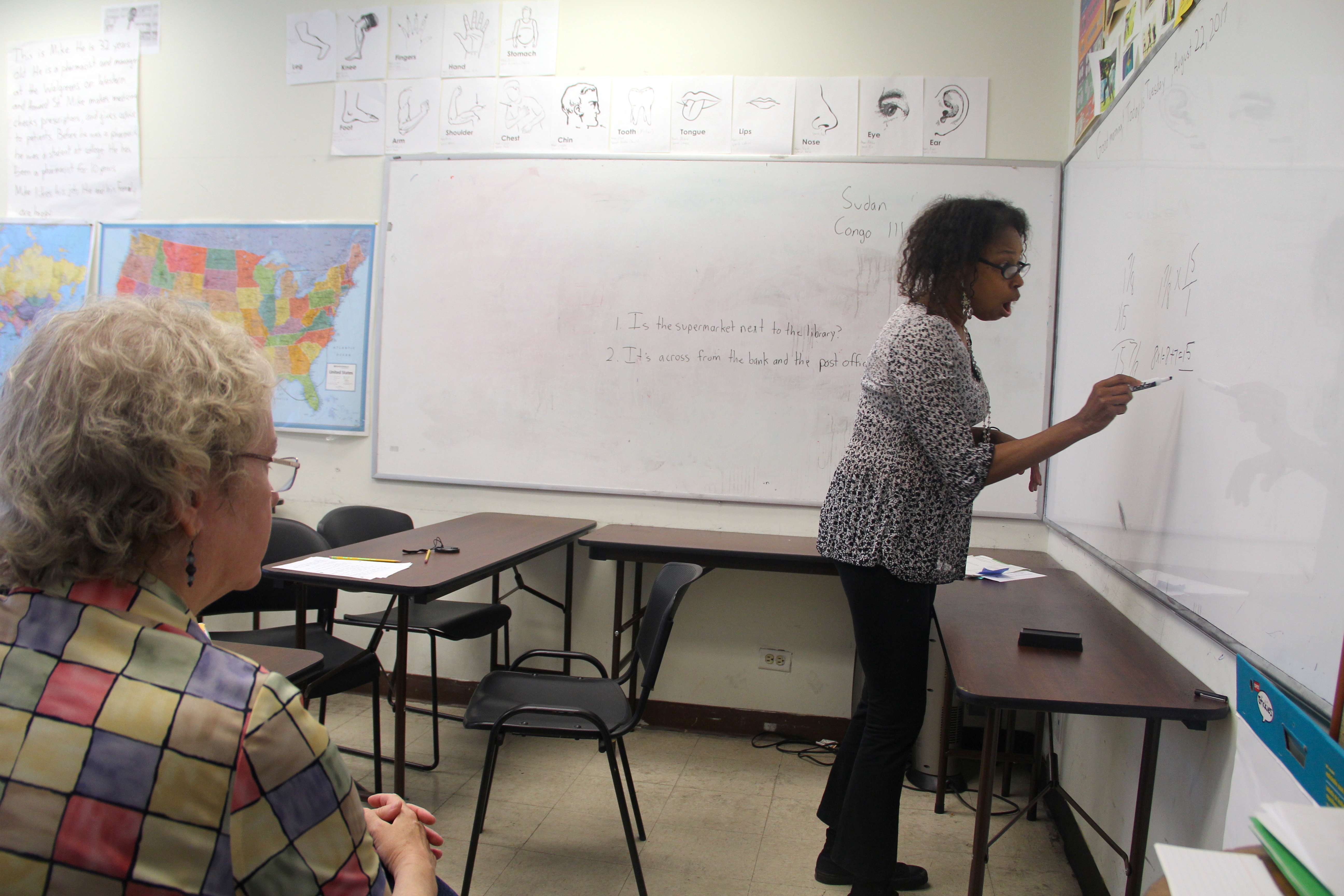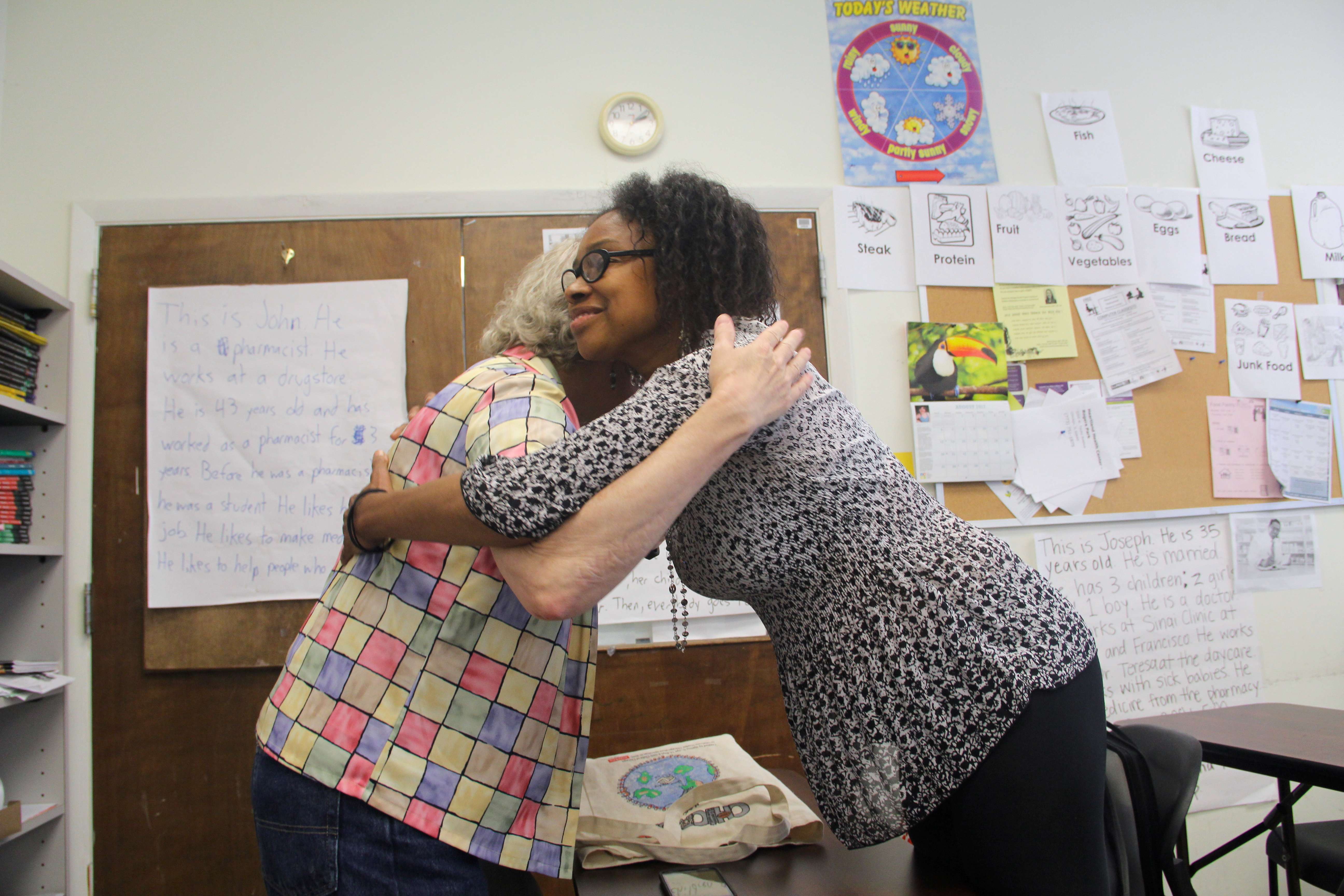Funding for adult education in Illinois is unstable, to say the least. Volunteer adult tutors are a lifeline for adults continuing their education. Just ask Toni (on the right), a budding jewelry designer, and her math tutor, Melanie Geyer.
“I said ‘My math stinks!’” Toni said, laughing. “But she [my tutor Melanie Geyer] was so encouraging. Not every teacher is like that.”
Toni is 63 years old. She’s studying jewelry making and just completed a year of free adult education tutoring at Howard and Evanston Community Center.
But Toni has lived many lives– perfume sprayer, assistant, retail worker, and more. She said that she used to be stuck in a cycle of low-wage jobs that didn’t fulfill her. She wanted to challenge herself and develop her natural talent– art.
A few years ago, Toni gathered the courage to apply to Depaul University. In 2016, she graduated (with honors!) with an art degree.
But her math skills were still lacking. To pursue jewelry design, she needed the math to make it happen.
“It’s very hard to have the courage to go out and say ‘I need help’”, Toni said. But her tutor Melanie, a social worker, made it easy by going the extra mile to research what Toni could use in everyday life.
“It’s helpful to know her goals and be able to look at some of these math problems and convert it into something that mattered to her,” Melanie said.
For instance, Melanie worked with Toni on: measuring in jewelry making units like centimeters and millimeters, calculating weights and carats of stones, and practical geometry, like circumference and radius problems, to craft rings.
Melanie was a social worker, so it’s no surprise that her tutoring sessions were peppered with affirmations like “absolutely” and “correct”, and good dose of humor.
Snippets from their last tutoring session said it all…

“If this was a test, look how long it took me to do this question.” Toni said.
“Well if it was a test you’d skip it and come back!” said Melanie.
“Isn’t this one of those problems where the zero keeps coming back down?” Toni asked.
“No.”
“Well it sure looks like it.”
“It’s magic for me because math and I are not good friends,” Toni said. She refuses to rely on calculators to make sure that she really knows the math, and practices three days a week.
After a year, Toni is still building her confidence. When she solves math problems correctly, she gasps. But she’s already successfully applied her math lessons in real life and avoided being cheated in the jewelry market.
Recently, a seller tried overcharge Toni for beads and string. She was able to recognize that they were overpriced after learning what questions to ask from math tutoring. Toni asked how much the seller was charging according to length and weight.
“I said, sir, how much are you charging per gram [for your beads]?” Toni said. The seller had no answer, and made it clear that he didn’t have a fair pricing system. Toni walked away from the sale, wallet intact.
Prior to this, Toni’s experience with jewelry was window shopping. She said she always felt uncomfortable in high-end jewelry stores, and would get followed because of racial discrimination. But, after building her skills and confidence with time and tutoring, she formed relationships with jewelers and fellow artists.
“I’m excited for the opportunity of becoming an exclusive jewelry designer,” she said. “I want to use every kind, color, and cut of gemstones. And by 2025, compete with Tiffany’s.”
Toni is nothing if not ambitious, and has already overcome the odds as an older Black woman seeking a higher education in a world of racial and socio-economic inequity at every educational level.
As a reference point, about 20 percent of 45-64 year olds have a bachelor’s degree in the Chicago area, according to a 2015 U.S. Census Bureau report, compared to 28 percent for adults 25-34 years old. Additionally, only 22 percent of Black Chicagoans have been able to earn a bachelor’s degree.
As for Melanie, she loved being part of the process. “I’ve always liked watching people grow. That’s just rewarding. That’s not something I do, it’s something the person does,” she said.

